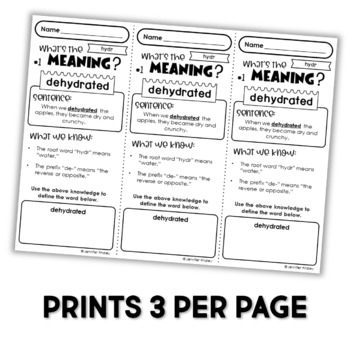Morphology Warmups Set 8: Using Roots, Affixes, and Context to Define Words
- PDF
- Google Apps™

What educators are saying
Also included in
- Studying morphology (affixes, bases, and roots) is a great way to connect decoding, vocabulary, and comprehension. Using these morphology warmups is a great way to implement morphology into your instruction in small group, whole group, or even reading centers.Note: If your 5th graders have receivedPrice $22.00Original Price $34.00Save $12.00
- Do you need a variety of resources to help you teach morphology or take your current morphology instruction to the next level? This MEGA bundle includes all of my current morphology resources and activities (excluding the word study lists which can you find here) and future resources including morePrice $125.00Original Price $292.00Save $167.00
Description
Knowing roots and affixes can help students both decode and understand unknown multisyllabic words. But when do you fit this in during instruction? Morphology warmups that help give students authentic practice with roots and affixes are a great option.
Morphology warmups are a great way to provide students ongoing support as they become more advanced decoders and readers.
What is Morphology and Why is it Important?
Morphology is the study of meaningful word parts in a language. These include roots, bases, prefixes, and suffixes.
Studying morphology in a variety of ways provides students with a strategic approach to learning AND decoding new words.
About The Reading Warmups
This set of reading warmups has the students reading a word, a sentence containing the word, and some information about what we already know about the word. Then the students provide their own definition of the word in their own words.
Option 1: Students are given the word, a sentence containing the word, and some additional information about the roots and affixes. Students use the information to define the word.
Option 2: Students are given the word and a sentence containing the word. A sticky note covers the “what we know” section of the activity and the students are asked to identity each root and affix in the word and define it before determining the meaning of the whole word.
Example 1:
Word: dehydrated
Sentence: When we dehydrated the apples, they became dry and crunchy.
What We Know:
- The root word “hydr” means “water.”
- The prefix “de-” means “the reverse or opposite.”
Definition: Dehydrate means “to lose or remove water.”
Example 2:
Word: aquatic
Sentence: Swimming is an aquatic activity.
What We Know:
- The root word “aqua” means water.
- The suffix “-ic” means “related to or associated with.”
Definition: Aquatic means “consisting of or relating to water.”
The purpose of these reading warmups is to:
- Allow students to see how knowing the meaning of roots can help them determine the meaning of unknown words.
- Allow students to see how roots and affixes work together to create the meaning of words.
- Give students practice with breaking unknown words into morphemes (roots and affixes) to uncover the meaning of those words.
Using the Reading Warmups
You can use these during a whole group instruction using the digital version. The digital option includes the same content, but has an editable text box for students to type their definition into. You can discuss the information provided about the word with your students, then have them define it together.
The printable reading warmups could be used as small group reading warmups.
Complete List of Words Included:
- dehydrate
- aquatic
- audiovisual
- phonics
- memento
- omniscient
- cyclic
- geocentric
- dictate
- scribble
- graphite
- temporary
- locomotive
- biographer
- photobiotic
- physics
- unison
- interrupt
- zoophobia
- extraterrestrial
- attract
- hemisphere
- transport
- podiatrist
- evacuated
Looking for more reading warmups aligned with the Science of Reading?
- Morphology Warmups BUNDLE
- Morphology Warmups Set 1: Reading Base Word Families
- Morphology Warmups Set 2: Base Word Creations
- Morphology Warmups Set 3: Add an Affix
- Morphology Warmups Set 4: Match the Meanings - Focus on Affixes
- Morphology Warmups Set 5: Prefix Warmups
- Morphology Warmups Set 6: Suffix Warmups
- Morphology Warmups Set 7: Root Word Families
- Morphology Warmups Set 8: Using Roots, Affixes, and Context to Define Words
- Morphology Warmups Set 9: Two Truths and a Lie
- Click here for ALL of my SOR-aligned resources!







